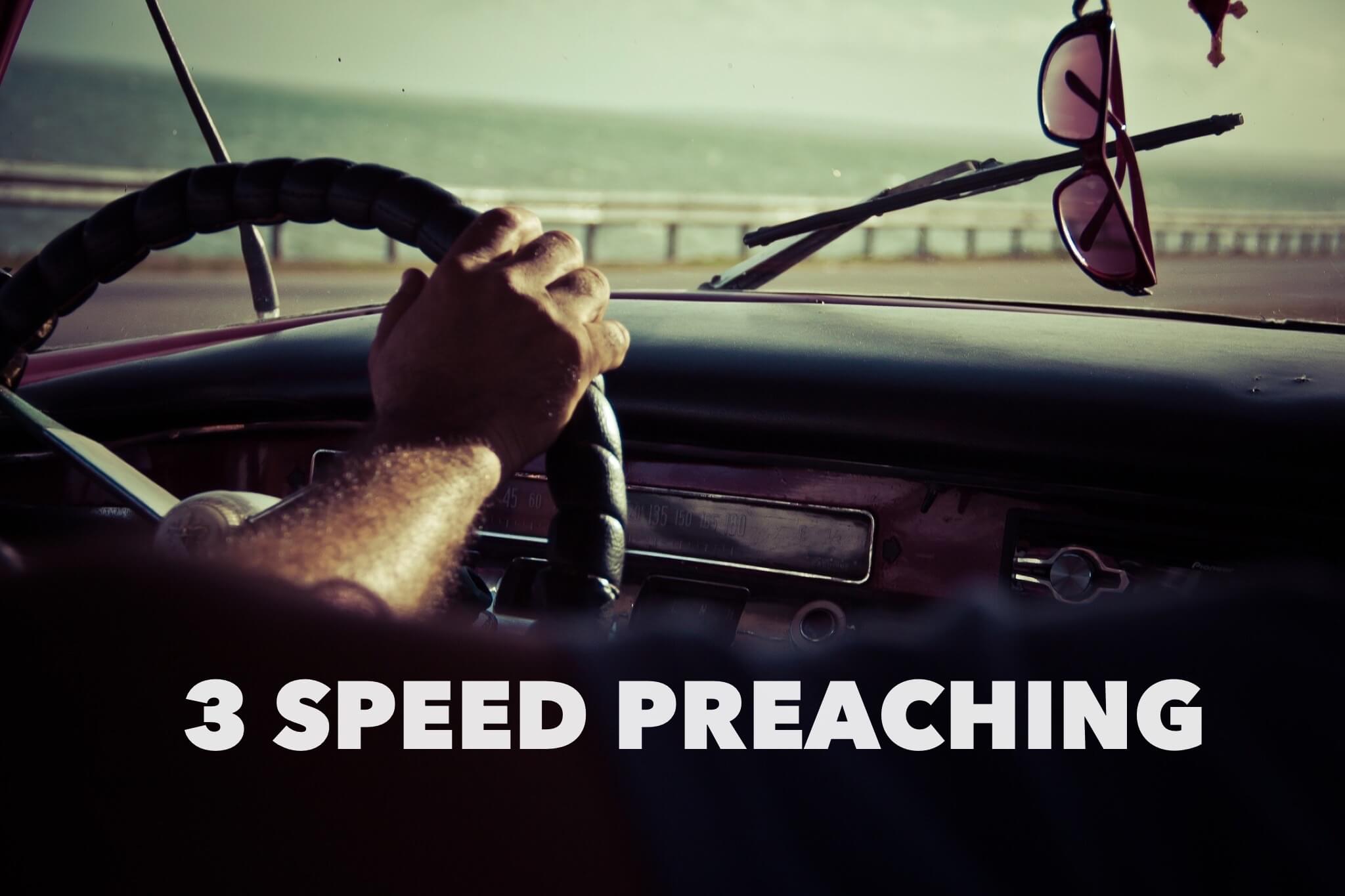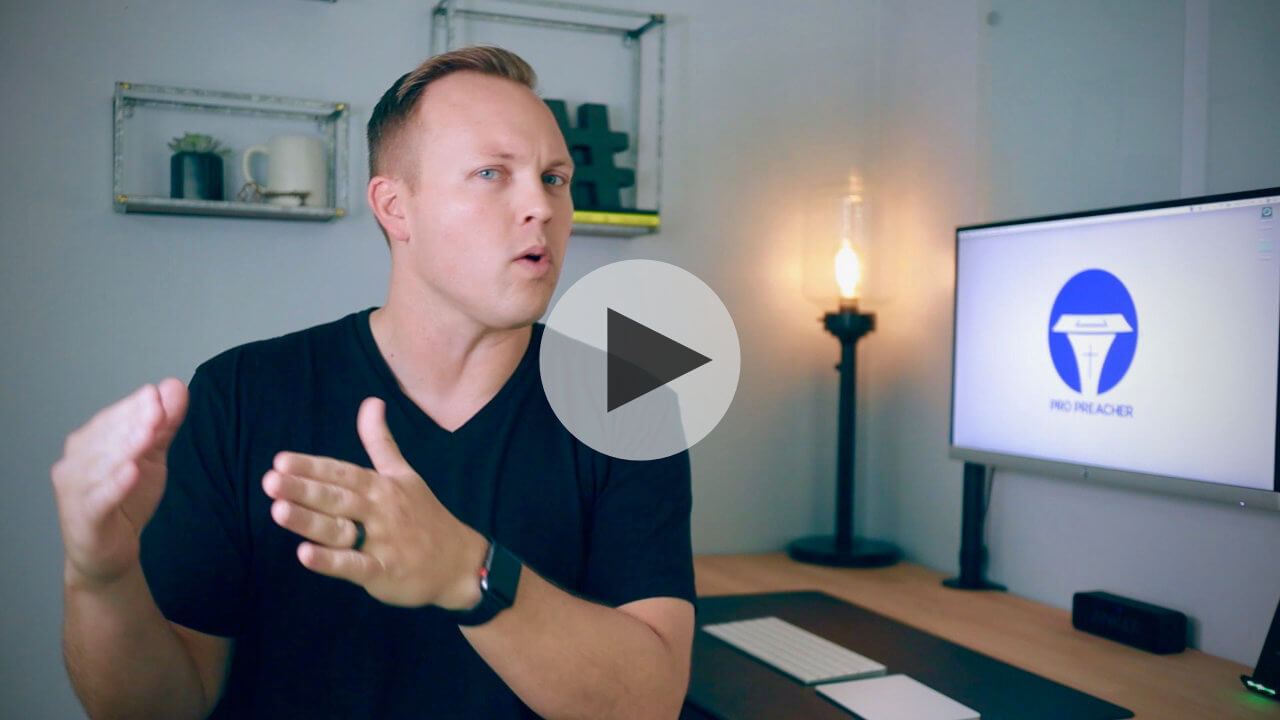3 Speed Preaching: Master Your Speaking Pace
You step on stage. The lights come up. Everyone is looking at you.
Adrenaline starts pumping as your fight or flight response kicks in. You are nervous. You are about to preach a sermon.
The problem: the nerves and adrenaline that are common in public speaking naturally cause pastors to preach too fast.
You are either too excited or so nervous you rush to get it over with.
When was the last time you evaluated the pace of your preaching? How would you grade yourself?
If you speak too fast, your audience may have trouble keeping up with you. They won’t be able to think about the words you say, and your message will lose impact.
Preachers with a fast pace appear nervous.
But if you speak too slow your audience may become bored and wish you would hurry up and say it already. They may begin thinking about other things, and your message will lose impact.
Preachers with a slow pace appear to lack passion.
If you want to become a better preacher, you have to master the art of speaking pace.
So what is the perfect pace? Faster? Slower? Somewhere in between?
The answer is YES. All three.
If you preach at the same pace for the entire sermon, your audience will quickly lose focus. You speaking will become monotone, no matter how fast or slow it is.
For example, prescription drug commercials do this on purpose. At the end of the commercial, the narrator reads the list of possible side effects fast without any change of pace. Unless you focus, you will naturally tune out because the pace is too quick and unvaried.
To master the art of preaching, you have to know when to vary the pace of your speech using all three speeds.
3 SPEEDS OF PREACHING
1. Average Pace – Conversation
Use your average pace of speech as your starting point.
It should be neither too fast nor too slow. Think of it as you normal conversational speed.
If you were having a one-on-one conversation with a good friend over lunch, how fast would you talk? This speed should be your average rate of speech. The majority of your sermon should be this pace.
If you want to get technical, many experts suggest somewhere between 130-150 words per minute.
Note: if you tend to be a fast-talker in conversations, you may need to slow down a bit more on stage.
2. Fast Pace – Excitement
Use a faster rate of speech to communicate urgency, excitement, or passion.
Speeding up is like putting an exclamation point (!) on a sentence. It lets the audience know you are excited!
Fast pace is good for…
- Telling an exciting part of a story.
- Expressing passion and enthusiasm when talking about how great something is or will be.
- Getting your audience excited.
- Setting up the audience right before slowing down for to emphasize a big idea or deliver a punch line.
3. Slow Pace – Emphasis
Use a slower rate of speech communicates seriousness and significance. When you fast and suddenly slow down, it signals to the audience “Listen. This is important.”
Slowing down is like putting a word in your sentence in bold or italics. It is a variation from the norm that highlights a key word or phrase to your audience.
Slow pace is good for…
- Complicated thoughts.
- Big words or terminology the audience may be unfamiliar with.
- Emphasis on a major point you want your audience to understand.
- Talking about serious things like death, suffering, or consequences of sin.
The key is knowing when to speak at an average pace, when to speed up, or when to slow down.
This only comes with practice.
HOW TO PRACTICE YOUR PREACHING PACE:
Practice while reading.
Read a book or article out loud like it is a sermon. Read at your average speed, and practice speeding up and slowing down at appropriate parts of excitement or emphasis.
Practice while rehearsing your sermon.
Work on your average pace and find the parts you want to speed up or to slow down.
Consider marking in your notes when you want to go fast or slow.
Practice with your favorite preacher.
Did you ever play the copy game when you were a kid? Someone would say something, and you would repeat them. You may have been annoying, but you can finally put those skills to good use!
Play a sermon podcast from your favorite preacher and copy them out loud. You will get a feel for their pace, and probably one of the reasons you enjoy listening to them.
Practice on video.
Record yourself preaching a sermon, or just rehearsing your sermon. Then grade your average pace. If it feels too fast or too slow, it probably is. If you are unsure, ask for feedback from people you trust.
Watch good actors and notice how they speak.
Great actors are great orators. They have likely mastered varying their speaking pace depending on the scene.
Watch your favorite movie or TV show with a fresh set of eyes focused on the rate of speech. Normal conversations will be different than a pivotal speech or an action-packed event.
See what you can learn.
ADDITIONAL TIPS:
Cut your content.
I’m often guilty of speaking too fast because I have more content than time. I want to get it all in there, so I speed up to make it all fit. Instead, I should keep only the most important content, and save the rest for another sermon.
Focus on enunciation.
Don’t rush words. Don’t mumble. Speak with clarity.
Punctuate with pauses.
If there is a comma, that should signal a slight pause. A period, question mark, or exclamation point should signal a full pause. Dramatic pauses (up to 5 seconds) convey confidence and authority. They allow the reader’s mind to digest what you just said.
CONCLUSION
There is a huge difference between words heard and ideas understood. If you speak too fast, your audience may hear all your words, but they will not understand all your ideas properly.
People need space to think, and variety to keep their attention.
Never stop evaluating the pace of your preaching. Even if you have been preaching for a long time, it’s easy to fall back into old habits.



Am really blessed
Thanks for the article it’s very helpful. I sometimes find myself speaking to fast. I have started practicing to control my pace when speaking. Thanks for this excellent article.
Excellent Article. I was very pleased when I went online to try and find out how many words per minute average to be directed to a Article. I was very pleased when I went online to try and find out how many words per minute average to be directed to a n article on preaching
I’ve been preaching for 35 years receive my doctor ministry in preaching with Dr. Hardin Robinson This is the first article I have ever read that so concisely and clearly gives practical advice preachers. This one should post it on the wall in your office practices every week until we become second nature
Wow, thank you, Clint. That means a lot to hear that from you. I’m so glad that you found the article to be helpful. Thank you very much.
Excellent article. I was very happy define a study of how many words per minute is average